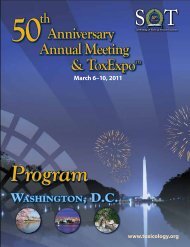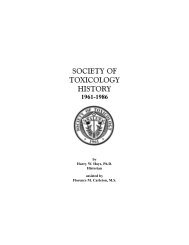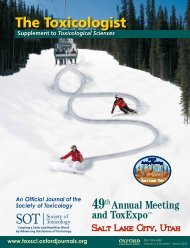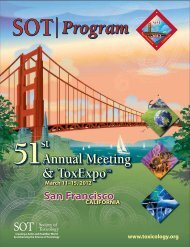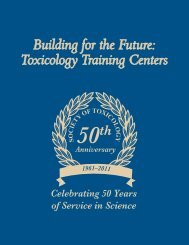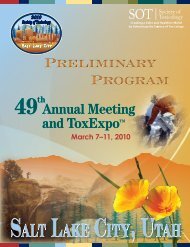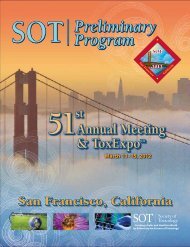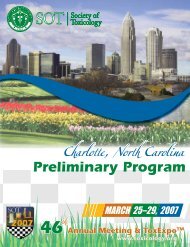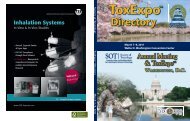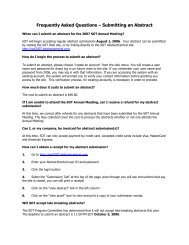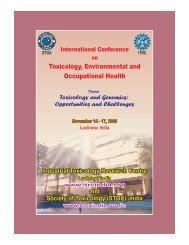- Page 1 and 2:
The Toxicologist Supplement to Toxi
- Page 3 and 4:
The Toxicologist Supplement to Toxi
- Page 5 and 6:
1 BIODEGRADABLE MATERIALS FOR TISSU
- Page 7 and 8: that genetic toxicology data are ge
- Page 9 and 10: well-orchestrated lung inflammation
- Page 11 and 12: scribed in the literature. We have
- Page 13 and 14: years ago). We will illustrate how
- Page 15 and 16: involved in the biodegradation proc
- Page 17 and 18: stem cells but rather a treatment i
- Page 19 and 20: additional compound showed agreemen
- Page 21 and 22: 82 COMPARISON OF 3H-THYMIDINE INCOR
- Page 23 and 24: irritants. While in practice these
- Page 25 and 26: alleles are especially vulnerable t
- Page 27 and 28: 109 CD4+ T CELL INTRINSIC TNF RECEP
- Page 29 and 30: 118 TO STUDY THE SIGNAL TRANSDUCTIO
- Page 31 and 32: PAHs, such as dioxins, are prevalen
- Page 33 and 34: containing substituents and/or hydr
- Page 35 and 36: 146 COMPUTATIONAL MODELING FOR QT P
- Page 37 and 38: suggest that the combination of too
- Page 39 and 40: 164 TRANSLOCATOR PROTEIN (18 KDA) (
- Page 41 and 42: function as a metal binding protein
- Page 43 and 44: laboratory has demonstrated that NR
- Page 45 and 46: known. The aim of this study was to
- Page 47 and 48: from 5 to 28 days in duration) in e
- Page 49 and 50: positive cells, caspase-3 activatio
- Page 51 and 52: creased level in the 46 kDa preproe
- Page 53 and 54: invasiveness at concentrations repr
- Page 55 and 56: thracene (DMBA,50 μg in acetone, a
- Page 57: 247 CO-CARCINOGENESIS OF N, N- DIET
- Page 61 and 62: ODD in both WT (maximum 177% of con
- Page 63 and 64: Lastly, using p53siRNA cells, p53 w
- Page 65 and 66: its receptor Mpl to exert its funct
- Page 67 and 68: 294 LOW LEVEL OF LEAD CAN INDUCE PH
- Page 69 and 70: lunar surface presented potential h
- Page 71 and 72: lar about cellular export mechanism
- Page 73 and 74: DNA in the kidney medulla, grandula
- Page 75 and 76: 5.00 and 7.50 mg/kg/day by oral gav
- Page 77 and 78: events and carcinogenesis. Here we
- Page 79 and 80: tinization of cells of the hair fol
- Page 81 and 82: 358 CHARACTERIZATION OF GENOME-WIDE
- Page 83 and 84: RNAi were also performed to identif
- Page 85 and 86: 376 A FUNCTIONAL CROSSTALK BETWEEN
- Page 87 and 88: UGT1A gene induction, while this re
- Page 89 and 90: tivity, specifically peroxisome pro
- Page 91 and 92: and cytotoxic effects; however, its
- Page 93 and 94: histone deacetylase that is necessa
- Page 95 and 96: ment. Paradoxically, buthionine sul
- Page 97 and 98: drug leflunomide and its major (A77
- Page 99 and 100: 442 GENE EXPRESSION AND MORPHOLOGIC
- Page 101 and 102: 451 INHIBITION OF THE MITOCHONDRIAL
- Page 103 and 104: 460 SULFORAPHANE PREVENTS ACETAMINO
- Page 105 and 106: drophilic/lipophilic balance. Other
- Page 107 and 108: pharmacokinetic and toxicological p
- Page 109 and 110:
489 USE OF ‘OMICS DATA TO IMPROVE
- Page 111 and 112:
498 APPLICATION OF AGE-SPECIFIC ADJ
- Page 113 and 114:
507 A DOSE VOLUME TOLERABILITY STUD
- Page 115 and 116:
involved the use of an acute inflam
- Page 117 and 118:
sorption in the gastrointestinal (G
- Page 119 and 120:
(ABC) transporters actively transpo
- Page 121 and 122:
545 BEHAVIORAL EFFECTS OF REPIN IN
- Page 123 and 124:
a blood pressure phenotype that res
- Page 125 and 126:
and inhalation exposure system that
- Page 127 and 128:
and lethality associated with these
- Page 129 and 130:
position, on vascular reactivity an
- Page 131 and 132:
therefore more accurate and reprodu
- Page 133 and 134:
commercial chrysotile product that
- Page 135 and 136:
elative to their controls. ST-depre
- Page 137 and 138:
ats. The majority of the studies fo
- Page 139 and 140:
in the China Jintan Child Cohort St
- Page 141 and 142:
corneum thickness, cellular epiderm
- Page 143 and 144:
645 EVALUATION OF THE IN VITRO EPIS
- Page 145 and 146:
654 TCDD ADSORBED ONTO NATURAL AND
- Page 147 and 148:
tion revealed no test article-relat
- Page 149 and 150:
671 INFLAMMATION AND TISSUE DAMAGE
- Page 151 and 152:
model, ethanol was found to inhibit
- Page 153 and 154:
689 ENHANCED SUPPRESSIVE FUNCTION O
- Page 155 and 156:
NAC + LPS yielded different levels
- Page 157 and 158:
707 LIFE-STAGE PBPK MODELS FOR MULT
- Page 159 and 160:
downstream of the apical endpoint o
- Page 161 and 162:
726 UPDATED ALUMINUM PHARMACOKINETI
- Page 163 and 164:
global parameter sensitivity analys
- Page 165 and 166:
and renal inflammation induced by 2
- Page 167 and 168:
754 PLASMA, URINE, AND TISSUE CONCE
- Page 169 and 170:
cently characterized transporter OA
- Page 171 and 172:
exposure system was developed from
- Page 173 and 174:
lood cell mass and decrease in urin
- Page 175 and 176:
practical alternatives to MC in non
- Page 177 and 178:
imals dosed with 167 mg/kg THU alon
- Page 179 and 180:
and organ weights, clinical signs a
- Page 181 and 182:
yet is induced in most bladder and
- Page 183 and 184:
830 RISK ASSESSMENT OF THE SPILL: C
- Page 185 and 186:
knowledgebase creation. Results are
- Page 187 and 188:
852 UNDERSTANDING STRUCTURAL AND PH
- Page 189 and 190:
for integrating epidemiology and an
- Page 191 and 192:
motor activity, including age of th
- Page 193 and 194:
y partial purification of urine (fr
- Page 195 and 196:
pacity for self-renewal and may dif
- Page 197 and 198:
sue. The depth of our analysis led
- Page 199 and 200:
910 IMPLEMENTING CALIFORNIA’S GRE
- Page 201 and 202:
concentrations in six tissues and b
- Page 203 and 204:
934 THE FDA’S LIVER TOXICITY KNOW
- Page 205 and 206:
943 GENOME-WIDE DNA METHYLATION DIF
- Page 207 and 208:
membrane localization and subsequen
- Page 209 and 210:
trols, respectively. Subtoxic and t
- Page 211 and 212:
survival using both smoking regimes
- Page 213 and 214:
as non-, weak, moderate, or strong
- Page 215 and 216:
988 NNK-INDUCED CYTOKINE ALTERATION
- Page 217 and 218:
group (one-way ANOVA, p90 % viabili
- Page 219 and 220:
ered as an organ involved in xenobi
- Page 221 and 222:
Transport of CPZ across the Caco-2
- Page 223 and 224:
estrous cycle and sexual behavior d
- Page 225 and 226:
mRNA expression levels. Collectivel
- Page 227 and 228:
1043 THE EFFECTS OF ENDOCRINE DISRU
- Page 229 and 230:
1052 MONO-2-ETHYLHEXYL PHTHALATE IN
- Page 231 and 232:
Results: MC was variable within and
- Page 233 and 234:
UtSMCs. Phosphorylation of FoxO1 wa
- Page 235 and 236:
nonpregnant and pregnant diabetic m
- Page 237 and 238:
1089 PFOA-INDUCED LIVER EFFECTS IN
- Page 239 and 240:
events in the liver. AZD9056 was ev
- Page 241 and 242:
The peppermint oil caused a concent
- Page 243 and 244:
OA did not affect food consumption.
- Page 245 and 246:
1126 PERSISTENT DEVELOPMENTAL ARYLH
- Page 247 and 248:
1135 BACH2 BINDING TO Prdm1 AS A ME
- Page 249 and 250:
The purpose of this project was to
- Page 251 and 252:
one marrow. Since Chk1 is an attrac
- Page 253 and 254:
1163 THE MRNA AND MIRNA PROFILE OF
- Page 255 and 256:
have now compared the IC50 values b
- Page 257 and 258:
1181 ELUCIDATION OF FACTORS DETERMI
- Page 259 and 260:
enced by pre-exposure to cigarette
- Page 261 and 262:
if abnormal PF was associated with
- Page 263 and 264:
weight (P=0.016) and small for gest
- Page 265 and 266:
portant cause of death, compared to
- Page 267 and 268:
posure groups. However, the differe
- Page 269 and 270:
Naphthalene is routinely analyzed i
- Page 271 and 272:
1245 SEASONAL CHARACTERIZATION OF H
- Page 273 and 274:
1255 URINARY T, T MUCONIC ACID LEVE
- Page 275 and 276:
modating a reliable data evaluation
- Page 277 and 278:
enzoquinone generate ROS and arylat
- Page 279 and 280:
teins (e.g. C3, 4, and 5, APOB, VDB
- Page 281 and 282:
1293 TRANSFORMING GROWTH FACTOR BET
- Page 283 and 284:
mation was decreased to the same le
- Page 285 and 286:
1312 EVALUATION OF THE SENSITIVITY
- Page 287 and 288:
luted OFR and CRL. Culture media ex
- Page 289 and 290:
urinary TCPy levels, blood and brai
- Page 291 and 292:
activity. The dose-response curves
- Page 293 and 294:
mice, each with 4 dose groups. One
- Page 295 and 296:
exposure to both ATR and DACT has a
- Page 297 and 298:
third tetratricopeptide repeats (TP
- Page 299 and 300:
7d. 28d after TMT injury there was
- Page 301 and 302:
subunits. Each cell type was treate
- Page 303 and 304:
1394 COMPARATIVE EFFECTS OF METHYLM
- Page 305 and 306:
1403 GENOTOXICITY AND PRE-NEOPLASTI
- Page 307 and 308:
vated only in high-dose-treated ani
- Page 309 and 310:
1421 DOSE-RESPONSE OF NAPHTHALENE-I
- Page 311 and 312:
cisplatin; 1.2-, 1.9- and 2.9-fold
- Page 313 and 314:
Day 11 and started to recover on Da
- Page 315 and 316:
1448 DEVELOPMENT OF A METHOD FOR QU
- Page 317 and 318:
1457 GLOBAL GENE PROFILING REVEALS
- Page 319 and 320:
cluding mouse and human macrophage,
- Page 321 and 322:
model of lung inflammation and host
- Page 323 and 324:
1484 NANOTOXICOLOGY AND NANOHEALTH
- Page 325 and 326:
throughput in vitro approach was us
- Page 327 and 328:
1502 IMMUNOLOGICAL ASPECTS OF AN AN
- Page 329 and 330:
(CIA) and the Streptococcal cell wa
- Page 331 and 332:
sitizers were 100% concordant among
- Page 333 and 334:
1530 MINIMAL RISK LEVELS FOR STYREN
- Page 335 and 336:
ical groups in the field of regulat
- Page 337 and 338:
vitro with this potentially insect-
- Page 339 and 340:
their performance on toxicological
- Page 341 and 342:
need for a better understanding of
- Page 343 and 344:
1577 AN IN VITRO MODEL SYSTEM FOR A
- Page 345 and 346:
gene expression post-transcriptiona
- Page 347 and 348:
1595 GENE EXPRESSION PROFILE OF RAT
- Page 349 and 350:
to confirm a hepatotoxic property o
- Page 351 and 352:
1613 AN INVESTIGATION OF THE CLEARA
- Page 353 and 354:
its nuclear translocation was reduc
- Page 355 and 356:
were collected from TK animals at d
- Page 357 and 358:
egulated targets were selected for
- Page 359 and 360:
U/L after tetracycline. Minocycline
- Page 361 and 362:
peri-pubertal FasL-/- mice show a d
- Page 363 and 364:
showed similar levels of apoptosis
- Page 365 and 366:
1676 TWO BIOMARKERS FOR EVALUATION
- Page 367 and 368:
motifs selected. This system was ap
- Page 369 and 370:
1693 VOC SERUM LEVELS IN THE GENERA
- Page 371 and 372:
1702 DOES THE CLOCK MAKE THE POISON
- Page 373 and 374:
those with high nickel content are
- Page 375 and 376:
isk assessment. However, unique cha
- Page 377 and 378:
model of APAP metabolism and glutat
- Page 379 and 380:
logically & morphologically similar
- Page 381 and 382:
posure, blood chemistry was analyze
- Page 383 and 384:
elated to oxidative stress by measu
- Page 385 and 386:
ostasis), but work is needed to tra
- Page 387 and 388:
tokine products during carcinogenes
- Page 389 and 390:
ways as chemical stressors and, the
- Page 391 and 392:
toxicity of nanomaterials relates s
- Page 393 and 394:
1815 MEASURING COMPOUND SELECTIVITY
- Page 395 and 396:
1825 EFFECTS OF METABOLISM BY INTES
- Page 397 and 398:
cyanoacetic acid increased 2-3 fold
- Page 399 and 400:
1845 IS THE PROMISCUITY OF THE ARYL
- Page 401 and 402:
crorarray analysis. RT-PCR results
- Page 403 and 404:
are a family of phase-II biotransfo
- Page 405 and 406:
ous labs. As a result of positive s
- Page 407 and 408:
down the doses may produce more tox
- Page 409 and 410:
spectively. Below 100 mg/l of gemfi
- Page 411 and 412:
1900 GENERATION OF PRECISION CUT LI
- Page 413 and 414:
iomarkers or observation of lesions
- Page 415 and 416:
creased reticulocytes and lymphocyt
- Page 417 and 418:
statistically significant interacti
- Page 419 and 420:
monize sample preparation and analy
- Page 421 and 422:
NPC and sinonasal cancer in neighbo
- Page 423 and 424:
showed incidences of lung and nasal
- Page 425 and 426:
utylbenzenes, exhibited most simila
- Page 427 and 428:
1975 DIFFERENTIAL MODULATION OF CYP
- Page 429 and 430:
organic As to MMA(V) and a lower ca
- Page 431 and 432:
ole in invasion and metastasis of c
- Page 433 and 434:
3T3-L1 cells to low-levels of arsen
- Page 435 and 436:
2011 IDENTIFICATION OF A NOVEL VX M
- Page 437 and 438:
This work was supported by Cooperat
- Page 439 and 440:
2029 EFFICACY OF ENDOTRACHEAL ADMIN
- Page 441 and 442:
Diazepam injections and its combina
- Page 443 and 444:
2047 ESTERASE ACTIVITIES AND HEMOST
- Page 445 and 446:
nanoparticle-induced toxicity progr
- Page 447 and 448:
house, were iv infused into rats ov
- Page 449 and 450:
een explored. This study investigat
- Page 451 and 452:
croscopic analysis revealed that on
- Page 453 and 454:
egg yolk collected from turtles inh
- Page 455 and 456:
consistency of results in both expe
- Page 457 and 458:
2111 CYTOCHROME P450 3A5 GENOTYPE I
- Page 459 and 460:
esidues of organophosphates or thei
- Page 461 and 462:
manganism. Recent work from our lab
- Page 463 and 464:
Aβ1-40 in CSF and hippocampus in P
- Page 465 and 466:
2147 CATALASE MANIPULATIONS MODIFY
- Page 467 and 468:
ation based on real-world exposure
- Page 469 and 470:
NPs. Aggregation of citrate-stabili
- Page 471 and 472:
2175 THE ROLE OF SURFACE CHEMISTRY
- Page 473 and 474:
seen rapid uptake in biological ima
- Page 475 and 476:
effect on uterine weight or vaginal
- Page 477 and 478:
dicating widespread exposure. While
- Page 479 and 480:
components into the liver parenchym
- Page 481 and 482:
2223 ISOLATION AND DETECTION OF RIC
- Page 483 and 484:
stored (-20 celsius degree). The co
- Page 485 and 486:
2241 DDA, A BIOMARKER FOR ENVIRONME
- Page 487 and 488:
2249 INTERACTION BETWEEN DIETARY SE
- Page 489 and 490:
2258 PHARMACOKINETICS, EXCRETION BA
- Page 491 and 492:
2267 SENSITIVE AND SPECIFIC FLUORES
- Page 493 and 494:
2276 METABOLISM AND DISPOSITION OF
- Page 495 and 496:
ment of hypertension in companion a
- Page 497 and 498:
for the propyl series can be used f
- Page 499 and 500:
2304 IN VITRO EXPOSURE AND EVALUATI
- Page 501 and 502:
2313 THE SYNERGISTIC EFFECT OF SODI
- Page 503 and 504:
genes that play a crucial role in M
- Page 505 and 506:
2330 THE ROLE OF TRANSFORMING GROWT
- Page 507 and 508:
ined following up to 96 h continuou
- Page 509 and 510:
effect doses obtained with the rat
- Page 511 and 512:
diated transcriptional response of
- Page 513 and 514:
docrine disruptor activities of EDC
- Page 515 and 516:
individuals. Week 6 results were qu
- Page 517 and 518:
functionality of photosystem II and
- Page 519 and 520:
wild mice (Mus musculus) from areas
- Page 521 and 522:
2406 TOXICITY AND BIOACCUMULATION O
- Page 523 and 524:
Isocitric acid is the acid in the h
- Page 525 and 526:
2425 EFFECTS OF FUMONISINS IN ETHAN
- Page 527 and 528:
centration(μg/g) were: 5.1-95.3; 2
- Page 529 and 530:
2445 AUTOPHAGY IN DEVELOPMENT: A LI
- Page 531 and 532:
sures to inhaled Mn in dust. Nevert
- Page 533 and 534:
2466 CRITICAL EVALUATION OF ANIMAL
- Page 535 and 536:
elationships predict that resting r
- Page 537 and 538:
2489 COMPARATIVE TOXICITY OF BIODIE
- Page 539 and 540:
2497 TRANSCRIPTIONAL REGULATION OF
- Page 541 and 542:
2506 TOXICOLOGICAL CONSIDERATIONS O
- Page 543 and 544:
launched with the aim of developing
- Page 545 and 546:
forms mRNA expression levels were a
- Page 547 and 548:
2534 CUTANEOUS WOUND HEALING IN THE
- Page 549 and 550:
wells (0, 1, 5, 10, 25, 50, 100, an
- Page 551 and 552:
2553 AN ORGANOTYPIC MICROLIVER PLAT
- Page 553 and 554:
serum-free media. At 24 hrs, the gr
- Page 555 and 556:
2572 INCREASED ARSENIC BIOACCESSIBI
- Page 557 and 558:
nology to develop improved methods.
- Page 559 and 560:
tuna, swordfish, or mako shark (3.5
- Page 561 and 562:
nificantly reduce circulating thyro
- Page 563 and 564:
grouped into 9 observation periods
- Page 565 and 566:
histopathological or biochemical ev
- Page 567 and 568:
exhibited a hyperactive phenotype,
- Page 569 and 570:
the search of effective drugs for e
- Page 571 and 572:
2644 COVALENT BINDING OF 14 C 2-MET
- Page 573 and 574:
aries targeting all transcription f
- Page 575 and 576:
(p 9 weeks) and CSC phenotype acqui
- Page 577 and 578:
2673 IMMUNE-MEDIATED VASCULAR INJUR
- Page 579 and 580:
for risk identification and charact
- Page 581 and 582:
to control toxicant delivery in tob
- Page 583 and 584:
Author Index (Continued) The numera
- Page 585 and 586:
Author Index (Continued) The numera
- Page 587 and 588:
Author Index (Continued) The numera
- Page 589 and 590:
Author Index (Continued) The numera
- Page 591 and 592:
Author Index (Continued) The numera
- Page 593 and 594:
Author Index (Continued) The numera
- Page 595 and 596:
Author Index (Continued) The numera
- Page 597 and 598:
Author Index (Continued) The numera
- Page 599 and 600:
Author Index (Continued) The numera
- Page 601 and 602:
Author Index (Continued) The numera
- Page 603 and 604:
Author Index (Continued) The numera
- Page 605 and 606:
Author Index (Continued) The numera
- Page 607 and 608:
Author Index (Continued) The numera
- Page 609 and 610:
Author Index (Continued) The numera
- Page 611 and 612:
Keyword Index (Continued) Arsenite
- Page 613 and 614:
Keyword Index (Continued) Covalent
- Page 615 and 616:
Keyword Index (Continued) flow cyto
- Page 617 and 618:
Keyword Index (Continued) innate im
- Page 619 and 620:
Keyword Index (Continued) nanoparti
- Page 621 and 622:
Keyword Index (Continued) preservat
- Page 623 and 624:
Keyword Index (Continued) Thrombocy
- Page 625 and 626:
Toxicological Sciences The Official



